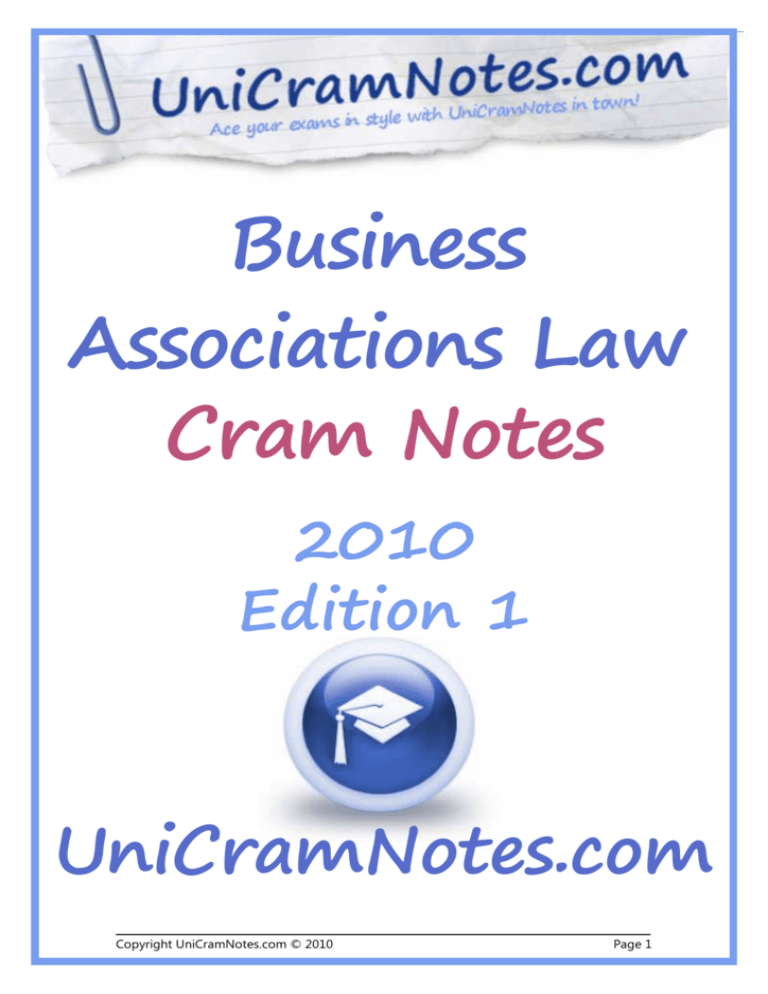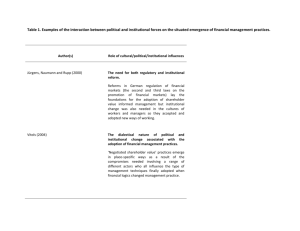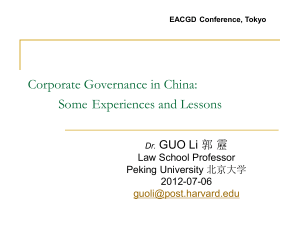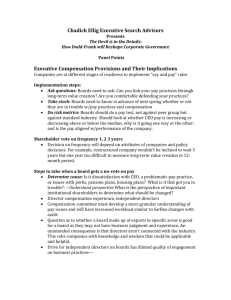Summary 2 - UniCramNotes.com
advertisement

Ace your exams in style with UniCramNotes B u s i n e s s A s s o c i a t i o n s L a w in town! N o t e s Business Associations Law Cram Notes 2010 Edition 1 UniCramNotes.com Copyright UniCramNotes.com © 2010 Page 1 Ace your exams in style with UniCramNotes B u s i n e s s A s s o c i a t i o n s L a w in town! N o t e s Topics 1. INTRODUCTION How to use Cram Notes Abbreviations 2. BACKGROUND A. B. Types of companies and corporations i. Proprietary companies ii. Public companies iii. Registration procedures Decision to incorporate i. 3. Limited liability IS THERE SEPARATE LEGAL PERSONALITY? A. Saloman’s Case B. Piercing the Corporate Veil i. Corporations Act ii. Avoidance of obligations iii. Fraud, Device or Sham iv. Agency, Under capitalisation and abuse of limited liability 4. 5. IS THE CORPORATE CONSTITUTION VALID? A. Nature and effect of the constitution B. Amendments to the constitution C. Implications for shareholder’s rights D. Replaceable rules and mandatory rules HAVE MEETINGS AND BOARD POWERS PROCEDURES BEEN IMPLEMENTED CORRECTLY? Copyright UniCramNotes.com © 2010 Page 2 Ace your exams in style with UniCramNotes B u s i n e s s A s s o c i a t i o n s L a w A. in town! N o t e s General meeting i. Requirements and Notice ii. Disclosure obligations (Common Law) iii. Decision making iv. Resolution v. Special Resolution vi. Shareholder approval vii. Residual control in general meetings (Doctrine of Unanimous consent) 1) Where the board is unable to act 2) Ratification of directors’ acts 3) Informal corporate acts B. 6. Board of directors i. Powers of directors ii. Appointing directors iii. Removal of directors iv. Managing director v. Decision making vi. Single shareholder/director companies ARE CONTRACTS WITH OUTSIDERS ENFORCEABLE? A. Did the person supposedly acting on behalf of the company have i. Actual authority? ii. Ostensible authority? iii. Protected under Indoor management rule or other statutory assumption as to authority? 7. DID DIRECTOR’S BREACH THEIR DUTY TO THE COMPANY? A. Duty to avoid conflicts i. Was there a personal interest? ii. Was there adequate disclosure of a material personal Copyright UniCramNotes.com © 2010 Page 3 Ace your exams in style with UniCramNotes B u s i n e s s A s s o c i a t i o n s L a w in town! N o t e s interest? iii. B. Were statutory disclosure obligations satisfied? Duty not to make secret profits i. Was there “secret profits”? ii. Was there a ratification of the breach? iii. Businesses started by former directors iv. Directors’ benefiting from opportunity turned down by the company v. C. D. Statutory duty Related party transactions i. Was the financial benefit given to a related party? ii. Was there shareholder approval? iii. Was there an exception? iv. Were procedural requirements followed? v. Application to private companies Statutory duty to prevent insolvent trading i. Was the company insolvent? ii. Was the person a director at the time the debt was incurred? 8. Is there a debt? iv. Did the debt that was incurred cause insolvency? v. Are defences available? vi. Consequences of contravention CAN THE DIRECTOR RELY ON AN INDEMNITY? A. 9. iii. The test IS THERE STANDING TO SUE THE DIRECTOR OR THE COMPANY? A. Who should sue and who should be sued? Other wrongs committed by company to shareholder in a collateral capacity B. Suing the directors Copyright UniCramNotes.com © 2010 Page 4 Ace your exams in style with UniCramNotes B u s i n e s s A s s o c i a t i o n s L a w i. in town! N o t e s Shareholders suing directors for breach of director’s fiduciary duty 1) Directors buying shares from shareholders C. ii. Statutory derivative suit iii. The Board of Director’s decision to sue Suing the company i. How to impute knowledge to the company ii. Shareholders suing company as a personal action iii. Shareholders suing company for other wrongs committed by company to shareholder in a collateral capacity iv. Shareholders suing company for fraud on the minority 1) Ratification 2) Constraints on exercise of power by special majority in changing constitution 3) Infringement of personal rights by breach of directors’ duty v. Shareholders suing company for fraud on the minority vi. Statutory oppression remedy 1) Unfairly prejudicial or discriminatory vii. Statutory winding up viii. Statutory injunction 10. REMEDIES A. B. Common Law remedies i. Rescission of contract ii. Account of profits iii. Equitable compensation ASIC Declaration of contravention i. Disqualification order ii. Pecuniary penalty order Copyright UniCramNotes.com © 2010 Page 5 Ace your exams in style with UniCramNotes B u s i n e s s A s s o c i a t i o n s L a w iii. in town! N o t e s Compensation order C. Statutory injunction D. Statutory oppression E. Statutory winding up i. Just and equitable ii. Directors have acted in affairs of company in own or others interests F. Statutory insolvent trading A snippet from our Business Associations Law Cram Notes Separate Legal Personality Saloman’s Case - As long as a company has been properly incorporated and validly constituted pursuant to the Act, then it becomes a fully fledged legal person, having a separate legal personality from the shareholders of the company. The member’s liability is thus limited by statue. - Doesn’t matter if bulk of capital issued to one person with the others holding nominal amounts, as long as no fraud or deception.--> Inequality, identity or connectedness of persons, interests and motivations are irrelevant if the formalities are completed. - This case also revealed that it was possible for a trader not merely to limit his liability to the money which he put into the enterprise but even to avoid any serious risk to the major part of that by subscribing for debentures rather than shares. [..] Indoor management rule - rule which protects third parties from the effect of irregularities in internal management Turquand’s case - persons dealing with a company in good faith may assume that acts within its constitution and powers have been duly performed and are not bound to inquire whether acts of internal management have been regular Copyright UniCramNotes.com © 2010 Page 6 Ace your exams in style with UniCramNotes B u s i n e s s A s s o c i a t i o n s L a w in town! N o t e s Northside Developments - IMR does not apply where there are suspicious circumstances sufficient to put the person upon inquiry - Put on inquiry where (cf s128(4)) Transaction unrelated to company’s business It gains no benefit out of it (but see s124(2)) - IMR only applies where it is something for which ostensible/apparent authority could be given – it does not create authority, merely allows third party to presume that the authority has been acted upon without irregularities. If signed/sealed without authority, then it is a forgery and company is not bound. The IMR is supplemented by s128-129 of the Corporations Act. Statutory assumptions as to authority Section 128(4) exclusion Generally the cases all seem to argue the 128(4) exclusion because the person being held out had no authority of any kind, or that it was forged, which should have been known to the third party. ‘Actual knowledge’ – If a company holds out a person to be the company secretary after an ASIC search revealed that he was in fact not the secretary, this will amount to a holding out by the company that the person could speak on behalf of the company in that transaction. (Brick) A refusal at first not to proceed because of the results of a company search does not constitute ‘actual knowledge’ of lack of authority in these circumstances (Brick and Pipe Industries Ltd v Occidental Life Nominees). ‘Connection or relationship’ – Third party’s relationship with the company prevents them from relying on the assumptions, because from their connection/relationship they ought to have known there was no authority/it was a forgery. (Story v Advance Bank). However here, because there was some benefit to the company in entering the loan, it was different to Northside and the bank would not be put on inquiry. ‘Ought to know’ – In considering whether s128(4) applies, the Court must ‘look at the person’s connection or relationship with the company in regard to the particular matter and then decide whether in those circumstances that person acting reasonably would know the true position about the matter Copyright UniCramNotes.com © 2010 Page 7 Ace your exams in style with UniCramNotes B u s i n e s s A s s o c i a t i o n s L a w in town! N o t e s assumed”: (Fiberi case). I.e. put a reasonable person in the position of the third party and see whether they knew or suspected. Here no benefit at all to Fiberi, and BNZ could not rely on assumptions. Note: ‘suspected’ (subjective test) in s128(4) is narrower than ‘ought to have known’ (objective test). Whether a benefit accrues to the company will be important in establishing s128(4). [..] Directors’ duty to avoid conflicts Adequate disclosure of material personal interest? Imperial v Coleman - Must state and identify the actual interest you have, not just a blank statement that you have an interest in the transaction Gray v Porcupine Mines - Facts: crazy guy completely milking the company. Directors agreed not to sue him. - The release was singularly favourable to himself. Only he knew how much he had appropriated. - Thus, full disclosure is required – must make his fellow directors fully informed of the real state of things. Is it a personal interest? Transvaal Lands (multiple duties owed to different entities) - Holding shares as a trustee will still be a personal interest capable of giving rise to a conflict of fiduciary duties. - Conflict of duties as director and trustee - A potential upcoming commitment (e.g. invitation to be director) may be enough to raise question of personal interest. Thorby v Goldberg - Board can fetter exercise of discretion in advance. London and Mashonaland - Multiple directorships - mere existence of a conflict of interest because of directorship in two companies does not give right to obtain a remedy. [..] Copyright UniCramNotes.com © 2010 Page 8 Ace your exams in style with UniCramNotes B u s i n e s s A s s o c i a t i o n s L a w in town! N o t e s Other wrongs committed by company to shareholder in a collateral capacity – Common law standing for shareholders Sometimes the shareholder will want a remedy because the company has done the shareholder wrong in some collateral capacity of the shareholder (some other capacity the shareholder has). Sons of Gwalia case - Facts: Margaretic bought shares subject to prospectus. But he didn’t know the company was nearly insolvent. When he bought shares, those funds were already subject to the floating charges over SoG’s assets. Shareholding virtually worthless! - Normally, shareholders are residual claimants, after creditors. - Persuade the court that the conduct of the company prior to him buying the shares (surrounding conduct – prospectus, actions in allotment of shares) caused him to become an outside creditor and not a shareholder. - HCA Margaretic can claim as a creditor, and establishes breach of misleading and deceptive conduct. His status as shareholder doesn’t affect, since he is not claiming on the basis of the s140 constitution of company. He is a “tort” victim of the company. He has two relationships with company. One as a shareholder qua shareholder, and another as a person duped into buying shares. i.e. two different capacities - Held: Ranked alongside creditors in claim We hope you have enjoyed this short preview of the Business Associations Law Cram Notes. Don’t forget to check out the Law Study Tips we have on our website at www.UniCramNotes.com! Copyright UniCramNotes.com © 2010 Page 9







